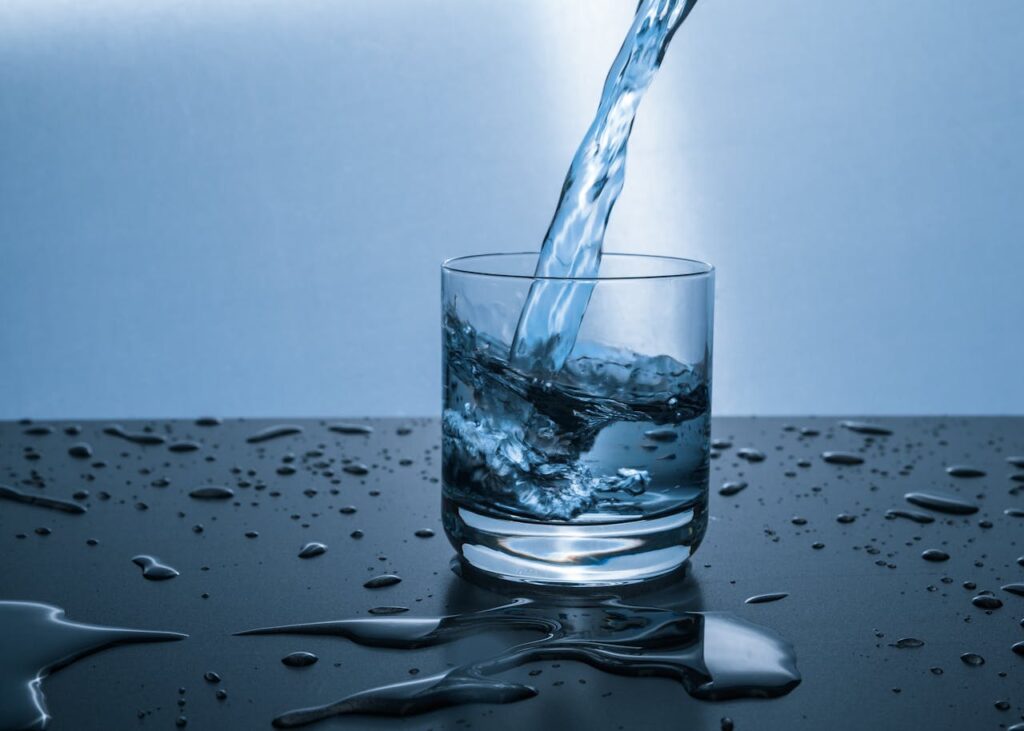6 Signs You might be Dehydrated in Perimenopause and What to Do About it

Why Dehydration can be an Issue During Perimenopause
Your oestrogen and progesterone levels fluctuate and also decline as you approach menopause. These two hormones play a big role in mechanism that controls your body’s hydration level. They help send signals that your body is thirsty, how much you drink, but they also regulate your levels of sodium and kidney function. Oestrogen increases water retention in your body, while progesterone has an important role in helping you get rid of excess fluid through urine. When levels of these hormones fluctuate and fall, it can impact your internal fluid balance.
In addition to that, some perimenopause symptoms can impact your ability to stay well hydrated: Enter night sweats, where you can lose a good amount of water sweating during the night, only to wake up dehydrated the next morning. How fun (insert sarcasm emoji)!
6 Signs you are Dehydrated
- Dark and smelly urine
This is the number 1 sign that you are dehydrated. Healthy urine should be very pale and not have much of an odor at all. If your urine is dark and smelly, it’s a sign that you need more hydration. - You are getting lots of hot flashes and night sweats
This is a vicious cycle. Night sweats and hot flashes can dehydrate you and being dehydrated puts pressure on your nervous system which then triggers more night sweats and hot flashes. - You often feel tired and lethargic
Your body is protecting you by conserving its ressources. When you feel tired and lethargic often chances are that you are dehydrated. A body that’s not well hydrated doesn’t want to move a lot. If you feel tired and lethargic a lot, try to drink more water or add a good electrolyte into your routine. - You have brain-fog and just cannot concentrate
Brain-fog and not being able to concentrate often comes in addition to feeling tired and lethargic. Your brain is like a sponge and needs lots of water to function properly. If its dehydrated and shrinks which then impacts its function. Even mild dehydration has shown to affect proper brain function. - Frequent Headaches
When your brain shrinks due to dehydration it can cause dehydration headaches. If headaches have become more frequent in midlife and if you have one or more other signs of dehydration, try to drink more water or add a good electrolyte to your daily routine and see if that impacts the frequency of headaches. - You are Constipated
When you are dehydrated your digestion slows down. Everything litereally gets sticky in your digestive tract. Your digestive track needs lots of water to process and eliminate the food during the digestion process. Without enough hydration you increase the risk of constipation.
What are Electrolytes
Electrolytes are minerals in your body that have an electric charge. They are essential for various bodily functions, including:
- Regulating Nerve and Muscle Function
Electrolytes help transmit electrical impulses across nerve cells and muscle cells, enabling movements and reflexes. - Hydrating the Body
They maintain the balance of fluids inside and outside of cells. - Balancing Blood Acidity and Pressure
Electrolytes help manage pH levels and blood pressure. - Rebuilding Damaged Tissue
They play a role in the healing and repair of tissues.
Common electrolytes include sodium, potassium, calcium bicarbonate, magnesium, chloride, and phosphate. They are obtained through diet and fluids and are lost through sweat, urine, and other bodily fluids. It is important to replenish and hydrate your body, especially after intense exercise of exessive sweating.
I like to start my day with an electrolytes drink and also replenish with electrolytes during my workouts. I like this electrolytes powder.
Tips to Prevent Dehydration During Perimenopause
- Increase Water Intake
Aim to drink at least 8-10 glasses of water a day. You can carry a water bottle to ensure you have access to water throughout the day. - Eat Hydrating Foods
Incorporate fruits and vegetables with high water content, such as cucumbers, watermelon, oranges, and strawberries. - Limit Diuretics
Reduce yourintake of caffeine and alcohol as they can increase water loss. - Monitor Salt Intake
High salt consumption can lead to water retention and dehydration. Opt for a balanced diet with moderate salt levels. - Stay Cool
Avoid exessive heat and stay in cool environments when possible, as sweating can increase fluid loss. - Electrolyte Balance
Consider drinks or supplements with electrolytes, especially after intense exercise or exessive sweating.

Pingback: The Power of Movement: 10 Reasons Why it's Crucial for Women in Perimenopause and How to Incorporate it into Your Life - Midlife with Miriam